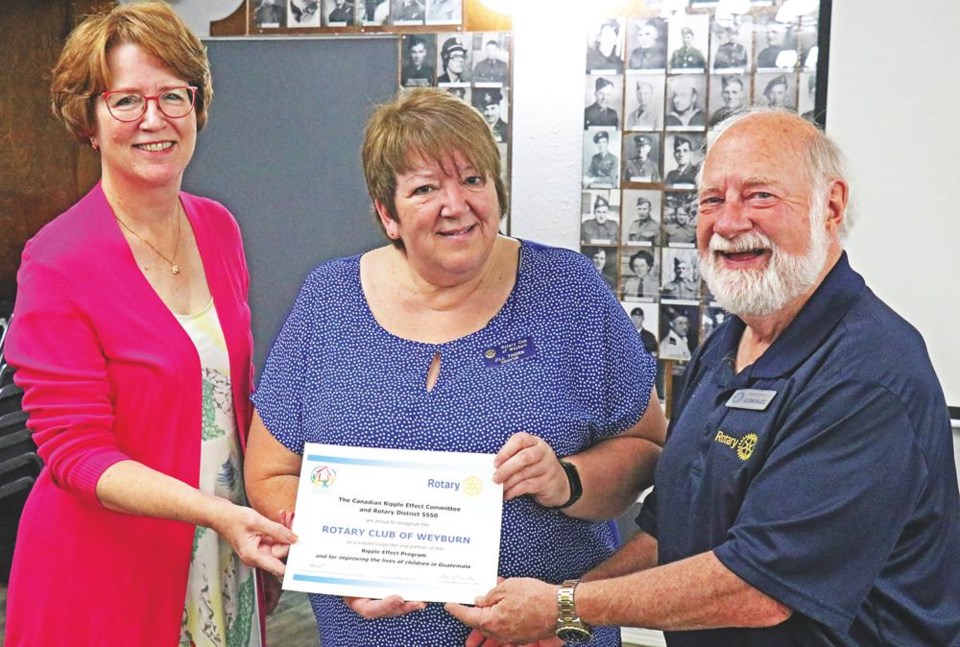WEYBURN – The Weyburn Rotary Club received an update on the Ripple Effect project in Guatemala, which involves building schools and related facilities, and helping students there get an education beyond Grade 6.
The update was provided by Moose Jaw Wakamow Rotary members Glenn Hagel and Marian Kettlewell, who showed a presentation of facts and photos from Guatemala, along with details about what the money donated by the Weyburn club has accomplished.
Kettlewell explained that the purpose of the Ripple Effect project is “to reduce poverty, and build peace in the communities we support. We provide educational opportunities and help them have a bright future.”
She added that children in Guatemala only have education paid for to the end of Grade 6, so families have to pay a private school if they want their children to attend middle school and senior high.
Hagel pointed out that the name of the program, the Ripple Effect, stems from the fact that helping a child get an education will improve not only that child, but their family, community and ultimately the country of Guatemala.
Funds contributed by the Weyburn Rotary Club, as part of a pool of Rotary Clubs in District 5550, have helped build classrooms, kitchens, washrooms and provided for scholarships to help students attend school beyond Grade 6.
In the 2020-21 year, the Ripple Effect program had funding of $204,000, assisting over 6,700 students, said Kettlewell.
The first school built under the program was constructed in 1999, and in 2005 they began to build middle and senior high schools.
During COVID, the Rotary committee for Ripple met on Zoom for their meetings, and by doing this they were able to have more connection with their partners in Guatemala.
Outlining the projects where Weyburn’s contributions have been used, the club was told their funds helped the Chuchuca School, the Heraldo Beltran Jr. School, and the El Boqueron School.
At the Chuchuca School, two classrooms were built, the ventilation was improved, and a computer added, and the school was part of a large 23-school project to improve water sanitation and hygiene, with new washrooms and wash stations installed.
The Heraldo Beltran Jr. School, in the community of Los Limones, had an existing building remodeled for use as the school, with a classroom created along with a multi-purpose room and storage, costing a total of $32,192, the largest project in the history of District 5550 (which includes the Weyburn club).
This school was built in a very poor area, with over 500 children waiting to be able to attend the school, who couldn’t be accommodated, said Kettlewell.
The El Boqueron School had three classrooms built for $14,000, along with a new paved playground and new stoves. As their part, each family is expected to contribute a piece of wood each day for fuelling the stoves.
Kettlewell noted that once the school project was done, the local municipality contributed by building a roof over the playground to provide a covered area that could be used by families in the community.
“It’s made a different to the community,” said Kettlewell, as has the girls washroom project, which has enabled girls to attend school now that there is a safe and secure facility for them.
Funds were also provided for cholarships to help children attend school beyond Grade 6, with 28 middle-school scholarships, at $160 a year per student, and 15 high school scholarships at $650 a year.
“We would love to be able to offer more scholarships,” added Kettlewell.
In addition to the Weyburn Rotary Club, other clubs which have also contributed to this program included Melfort, Moose Jaw and Estevan.
Hagel said the Moose Jaw club considers their Guatemalan partner clubs as “sister clubs”, and he noted, “They are gradually becoming more and more proactive in terms of attracting more resources from inside Guatemala.”
In addition, when there is a school or washroom-building project set to go, most times there will be local volunteers who will help provide labour for the project to help it get built, he added.
Hagel pointed out a quote from a Rotary member in Guatemala which sums up part of the aim of the project: “It’s not the school that Rotary built, it’s the school Rotary helped us get built.”





